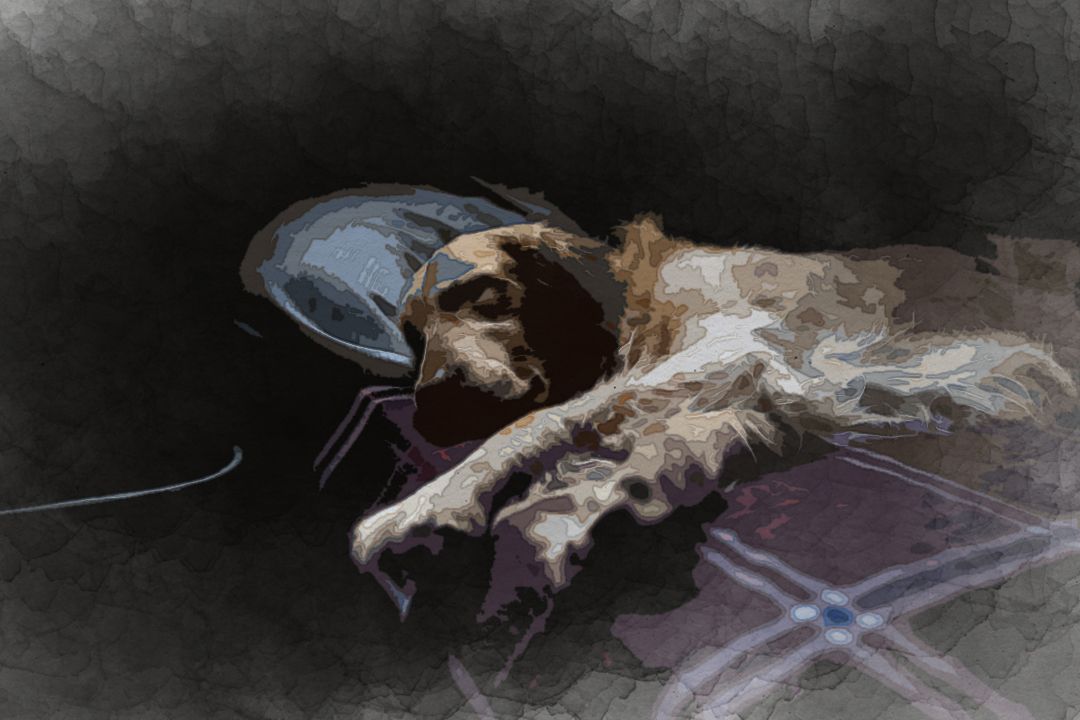Action Potentials Made Manifest

I Doubt This Cartesian Doggy Wants to Sleep Till Noon
Sophia, the golden retriever with a philosophical bent, often found herself the center of an unusual circle. Her owner, Professor Alexander, noted for his lectures on Descartes and penchant for canine company, would joke that Sophia harbored the soul of a scholar in her furry breast.
Learning never exhausts the mind.
— Leonardo da Vinci (1452-1519)
This was a sentiment that Sophia, in her quiet canine way, seemed to embody. She would attentively sit by Alexander during his readings, her head tilting at the turn of each page, her ears perking up at the complex cadences of academic discourse. She never tired, her gaze intent and unblinking, as if absorbing the very essence of the knowledge that filled the room. Her enthusiasm for learning was not lessened by the absence of speech; it was as if she was gathering the scattered crumbs of wisdom, feasting on them in a manner that was invisible to the human eye.
Sophia’s days were punctuated by the rhythmic turning of pages, the soft scratching of Alexander’s quill, and the endless parade of students who found in her a silent confidante. Her presence was as much a fixture in the library as the mustiest tome, and it was whispered that the most complex philosophical puzzles seemed less daunting in her company. With a wisdom that seemed to stretch beyond her years and species, Sophia would nuzzle a disheartened scholar, sparking an epiphany with nothing but a warm, gentle snout.
In Alexander’s more playful moments, he would construct elaborate scenarios, imagining Sophia debating with the great minds of history, her barks translated into eloquent treatises on the nature of reality. He envisioned her at symposiums, her tail wagging in rhythm to the applause of an invisible audience, her canine insights cutting through the murk of human overthinking.
Even the campus squirrels, usually the subject of fervent chases by less scholarly dogs, seemed to acknowledge Sophia’s unique disposition, approaching her with a reverence reserved for a creature not entirely of their world. They would sit, a respectful distance away, and chatter among themselves as if sharing in the grand academic tradition.
And when the day's learnings drew to a close, Sophia would retire to her plaid bed, not to rest, but to reflect. Her dreams were vivid tapestries where the voices of da Vinci, Plato, and Curie mingled. She would wake with a start, as if surprised that her paws couldn’t grasp the parchment, her bark couldn’t echo in the lecture halls, and her thoughts couldn’t be inscribed for posterity.
But in those dreams, she was undeterred by the limitations of her canine form. She learned and relearned, her mind never wearying, her spirit never flagging. For Sophia, each sunrise brought a continuation of her silent scholarship, her eyes holding the spark that comes from an inexhaustible love for learning, a love that was her bond with Alexander and the foundation of their shared, unspoken understanding.
As the dawn crept through the library windows, casting a mosaic of light upon the shelves, Sophia’s dreams gently gave way to the world of the waking. The tranquility of the room seemed to echo with the silence of her thoughts, a vast, internal landscape that only she could traverse. It was in these early hours that Professor Alexander observed her most closely, noting the serene expression that graced her features.
That inward eye Which is the bliss of solitude.
— William Wordsworth's (1770-1850)
Alexander often mused about the nature of Sophia’s inner world. What did she see with that inward eye of hers? He imagined her mind to be a universe unto itself, a place of boundless solitude where she reveled in the quiet grandeur of her own spirit. Perhaps, he thought, Sophia found joy not in the accolades that her intellectual pursuits could never yield, but in the purity of contemplation, the silent dialogue between her soul and the essence of things unseen.
As the university town began to stir, its denizens none the wiser to the quiet communion between man and dog, Sophia maintained the blissful repose that solitude afforded her. She was at peace amidst the tomes and texts, a sentinel of silence in the cacophony of academic pursuit. Her solitude was not a void but a canvas, upon which the colors of her consciousness painted scenes of ethereal beauty.
Alexander, ever the solitary figure himself, found a kindred spirit in Sophia. Where others sought companionship in the crowded halls and bustling cafés, he and Sophia shared a companionship that was enriched, not diminished, by silence. Together, they delved into the mysteries of thought and emotion, their bond a bridge over the river of loneliness that often runs through the heart of those who dare to dream.
In the afternoons, when the library was hushed but for the whisper of pages and the scratch of pen on paper, Alexander would look upon Sophia and see the embodiment of Wordsworth’s bliss. In her stillness, there was a resonance, a frequency that vibrated with the subtle yet profound joy of solitude. She had found what so many seekers yearned for: a peace that comes not from without, but from within.
He penned letters and papers with Sophia at his feet, her presence a gentle reminder of the strength that solitude confers. Alexander had long since ceased to pity those who could not appreciate the power of a solitary existence, for he knew that in the company of his Cartesian doggy, he had discovered a universe of companionship.
As the sky turned the color of aged parchment, and the university’s ancient clock tower chimed the hour, Sophia’s inward eye closed once again, and she journeyed back into the realm of her dreams. Alexander watched over her, a smile playing on his lips, knowing that in her solitude, Sophia found a world that was wholly her own, a world as infinite as the stars and as intimate as a whispered secret.
Her dreams carried her until the edges of evening blurred into night, and Alexander’s writing tapered off into the soft scratching of a quill laid to rest. Together, in the library that was their sanctuary, they dwelled within the heart of solitude, where the inward eye sees all.
Evening draped the university in a tapestry of twilight, as students and professors alike retreated to their homes, leaving the hallowed halls to the custodians of the night. Sophia, with her day’s worth of contemplation and silent learning, watched as Alexander prepared for an evening of solitude—not of loneliness, but the solitude of thought and a respite from the world’s clamor.
Let us leave the beautiful women to men with no imagination.
— Marcel Proust's (1871-1922)
This was a sentiment Alexander often quoted with a twinkle in his eye, directing it at his more superficial colleagues who sought beauty only in the physical, failing to appreciate the allure of the intellectual and the abstract. He and Sophia, a pair of unconventional thinkers, took pleasure in the more nuanced splendors of existence. Their world was one of ideas and ideals, where beauty was found not in the symmetry of a face but in the symmetry of a well-structured argument or the elegant solution to a philosophical quandary.
Sophia, in her own way, understood the essence of Proust’s words. She had seen many a passerby admiring her lustrous coat and soulful eyes, yet it was Alexander’s lack of concern for her breed's conventional beauty that had forged their deep connection. He had chosen her not for her pedigree, but for the contemplative gaze that seemed to peer into the very soul of the world.
Their evenings were spent in shared silence; Alexander, poring over his books, and Sophia, watching with eyes that spoke of a profound understanding. The other professors boasted of their evenings spent in the company of striking beauties, but Alexander found a richer companionship in the quiet presence of his canine friend. Together, they explored the landscapes of thought, where beauty was a concept as fluid as the inky words that flowed from Alexander’s pen.
The university town, with its cobblestone paths and ivy-clad buildings, was a haven for those who sought beauty in the conventional sense. But behind the closed doors of Alexander’s study, beauty was redefined. It was in the arch of a mathematical curve, the resonance of a historical narrative, and the quiet companionship of a dog who understood that true beauty lies in the spaces between, in the imagination that sees beyond the surface.
As night deepened and the stars began their ancient storytelling, Sophia would occasionally break her contemplative repose with a soft woof, as if affirming a point Alexander had made, or perhaps posing a question of her own. And Alexander would laugh, a sound that was both a tribute to Sophia’s wisdom and a celebration of their shared life of the mind.
Sophia’s musings, though silent, were not unappreciated. Alexander knew that if she could speak, her words would be as insightful as any philosopher's. In her company, he found the freedom to explore the realms of imagination, where beauty was as boundless as the night sky and as intimate as the trust they shared.
The clock tower struck midnight, and the world outside faded to a whisper. Inside, the gentle breathing of the Cartesian doggy and the soft rustle of turning pages were the only sounds. Here, in this sanctuary of thought, Sophia and Alexander lived a life of imagination, their friendship a testament to the beauty that thrives in the minds of those who dare to dream.
As the moon climbed higher, casting its silver gaze upon the world, Sophia and Alexander remained ensconced in the warm glow of the study. The books lay open as if in silent conversation with the readers, their pages a testament to the human quest for knowledge and meaning. Outside, the world was locked in slumber, but within these walls, the night was alive with the electricity of thought and dream.
All human beings are also dream beings. Dreaming ties all mankind together.
— Jack Kerouac (1922-1969)
Alexander often pondered Kerouac’s words, finding a profound truth in the notion that dreams were a universal tapestry, connecting all of life in their silent, unseen narratives. He watched Sophia as she twitched in her sleep, her paws running through dream-grass, her soft whimpers painting dream-sounds in the quiet air. It was a marvel to him, how this gentle beast could, in her dream-state, join the ranks of dreamers stretching across time and space, her spirit mingling with the ephemeral essence of humanity.
In these moments, Alexander felt a kinship not just with Sophia, but with all beings capable of dreaming. The study, with its ancient wood and walls lined with wisdom, seemed to him a vessel sailing through the dream-fog, its passengers—the dreaming dog and the dreaming man—adventurers in the vast ocean of the unconscious.
Sophia’s dreams were not just a series of disjointed images, but stories, rich in detail and emotion. Alexander imagined that if Sophia could recount her dreams, they would be sagas of epic proportions, filled with heroism, adventure, and perhaps a touch of canine humor. In her sleep, she was not merely a dog; she was a dream being, traversing worlds that Alexander could only glimpse in the edges of his own night visions.
As he sat there, the laughter of the day’s earlier jest echoing in the memory of the walls, Alexander penned his thoughts on dreaming. He wrote of the unity it brought to all life, the shared stage upon which every creature played its part. Sophia’s silent dreaming was a dance, choreographed by the primal forces that move all souls, and in watching her, Alexander felt an overwhelming sense of connection to the vast, dreaming collective.
The night wore on, and the moon’s arc dipped towards the horizon. The symphony of dreams played on, an invisible orchestra to which only those who dreamed could tune in. Sophia ran through fields of starlight in her sleep, chased by shadows that bore no malice, only the playful tease of the nocturnal muse.
And Alexander, in his solitude, found comfort in the thought that his dreams were not solitary flights, but part of a grand, universal dreaming. His laughter mingled with the countless chuckles and guffaws of sleepers everywhere, a shared merriment that wove through the tapestry of the night.
As the first light of dawn began to seep through the blinds, casting a pale, blue hue over the room, Sophia stirred. Her eyes opened, reflecting the wisdom of the dreamer, and she gazed at Alexander with an understanding that transcended words. They were two beings, human and canine, yet in that moment, they were united in the fraternity of dreamers—a bond as ancient as time, as profound as life itself.
Alexander closed his book, the pages filled with musings on dreams and dreamers, and he smiled at Sophia. Together, they had journeyed through the night, each in their own way, yet together in the realm of dreams.

The planksip Writers' Cooperative is proud to sponsor an exciting article rewriting competition where you can win part of over $750,000 in available prize money.
Figures of Speech Collection Personified
Our editorial instructions for your contest submission are simple: incorporate the quotes and imagery from the above article into your submission.
What emerges is entirely up to you!
Winners receive $500 per winning entry multiplied by the article's featured quotes. Our largest prize is $8,000 for rewriting the following article;

At planksip, we believe in changing the way people engage—at least, that's the Idea (ἰδέα). By becoming a member of our thought-provoking community, you'll have the chance to win incredible prizes and access our extensive network of media outlets, which will amplify your voice as a thought leader. Your membership truly matters!


